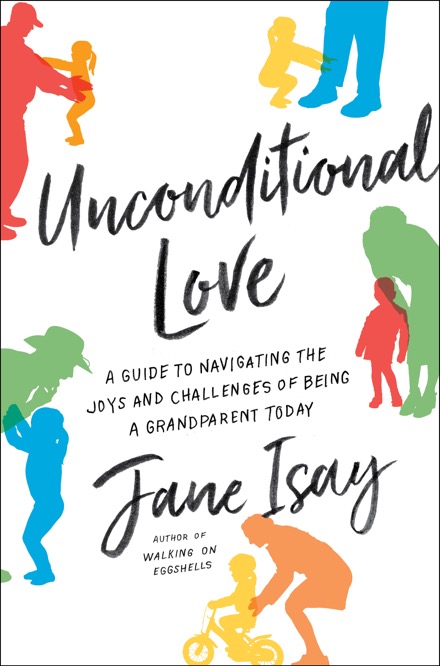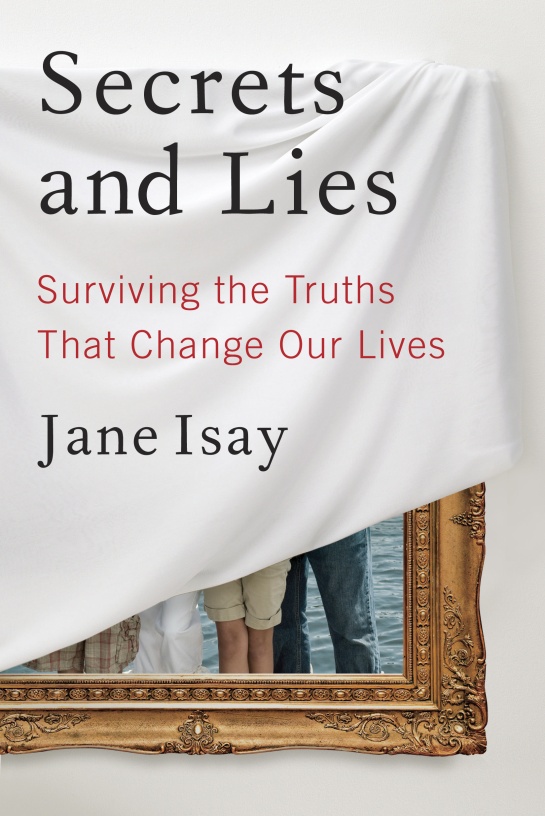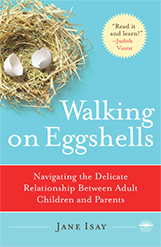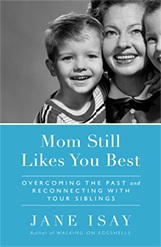
Unconditional Love:
A Guide to Navigating the Joys and Challenges of Being a Grandparent Today
Difficulties rarely appear between grandparents and the grandkids. Suddenly our grown children have the power to let us be with the grandkids—or not. We may be welcome—or not—on the basis of what we say, what we do, and how we behave. How can we overcome these conflicts and accentuate the love that leaps? How can we help the grandchildren blossom in this troubled world? Help is on the way.
Learn more“Unconditional Love is an up-to-date guide to grand parenting in the twenty-first century that also offers readers the deepest and most universal wisdom. Isay unspools her stories of grand parenting in a way that increases our moral imaginations and our capacities for joyous and profound family experiences.”
--Mary Pipher, author of Reviving Ophelia
“In Unconditional Love, Jane Isay focuses on a human bond that is valuable for all it involves This thoughtful book is not simply a guide to being a grandparent, but also a paean to the generosity of spirit that may reveal itself in later life. The child is father and mother to the grandparent, as much as the grandparent serves the child. In a way, both imagine the best of each other, enhancing a capacity for living well and usefully. An original and indispensable piece of work, written with as much intelligence as love.”
--Roger Rosenblatt, author of Making Toast
“Do you wonder why it’s essential to court you daughter-in-law despite her inflexible and strange beliefs about what kids should--and should NEVER!--eat, when they should go to bed, and what falls into the category of an acceptable birthday gift? Or why you shouldn’t take it personally if your grandchildren don’t respond to your phone calls or e-mails? Using startlingly deep insight into the impact of the past decades of social and economic change on family life and an authoritative yet friendly tone— respectful of all three generations involved—Isay shows the reader how to navigate the new choreography of grandparenting and enter into a dance of grace and delight.
--Wendy Mogel, author of The Blessings of a Skinned Knee
Unconditional Love begins with the announcement of the impending birth of a grandchild and ends with the friendship between grown grandchildren and their grandparents. As I spoke with grandparents, parents, and grandchildren, I learned that the difficulties rarely appear across these generations. It’s the two adult generations that spar. Daughters-in-law resent the criticism of their husband’s mother. Grandparents scoff at the rigidity of their children’s rules. Competition between the grandparents in the two families can alter happy occasions.
Then there’s distance, physical and emotional. It’s hard to maintain intimacy across time zones. Sometimes grandparents feel like ATM machines, and the grown children can’t understand why their parents no longer rush to their aid. Grandparents are suddenly saddled with the care of grandchildren, when a parent suffers illness or addiction. It’s not easy.
Even though grandchildren grow up as their grandparents grow old, a strong foundation of love and concern will not fail us. We need to remember that despite all the conflicts, all the changes, and all the difficulties, love across the generations will abide.
Grandparents wonder:
Seat belts and other safety issues make the grown children crazy. Why do I have to listen? I raised them to adulthood.
What makes my grown children think candy is poison? Kids love a treat.
And what’s so wrong with grandkids having screen time when we are exhausted?
Why can’t we bring presents to our grandchildren? We love to make them happy.
Why does our daughter-in-law make things so difficult?
My grown kids only call when they need something. They rarely ask how I am.
Parents of the grandchildren shake their heads:
My mother is even critical of the way I put the baby to bed.
Grandpa lets the kids sit in the back of the pick-up truck—no seat belts. That’s dangerous.
We want our kids to have good values, yet the grandparents insist on bringing gifts.
I resent my parents’ judgment that their grandkids don’t have perfect manners.
Why can’t my mother stop telling me how to raise my kids?
How come they will help my sister’s family--but not mine?
Grandchildren, on the other hand, have their own reality:
There’s nobody in the world I respect more than grandmother.
My grandfather gave me the courage to follow my dream.
Grandma was a character, and we laughed and loved each other right to the end.
Click here to read The New York Times article "Where are all the grandparenting books?"

Secrets and Lies:
Surviving the Truths That Change Our Lives
When we learn a big secret, it feels like Life Interrupted. The world goes dim and anxiety grows. Keeping secrets impedes intimacy and fragments the soul of the Keeper, who plays different roles in different situations. Learning the truth about parents, spouses, and life history is shocking and painful to the Finder, but clarifies misty parts of our past. Still, you can make the truth your friend, no matter how impossible that seems at first.
Learn more“A wise, brave, and gripping book about the stories families hide from one another, Secrets and Lies instructs us in the many important ways that even painful truths can set us free.”
—Judith Viorst, author of Necessary Losses
Reality Interrupted
When the revelation comes, the pain has as much to do with your love for the person as it does with your sense of betrayal. There are three stages of response: the betrayal, figuring out what to do with your life, and figuring out what to do with your love.
People worry that the truth will devastate their lives.
It doesn’t have to.
Find out how liberating honesty can be.
Secrets and Lies: Surviving the Truths that Change our Lives
Secrets and Lies emerged from my own life experiences. I was married for 15 years when my husband revealed the truth about his homosexuality. When I experienced the shock and trauma of revelation I became a very sad Finder. We decided to stay married and keep the truth from our sons, and for ten years, I colluded with him to guard our shared secret. So I know what it feels like to be a Keeper as well. I wrote this book to shed light on a dark and hidden area of family life. Here are some of the things I learned from dozens of interviews conducted over two years.
People hide the truth for all kinds of reasons. Some of them are meant to protect themselves, some to protect others.
When a secret is revealed, the world changes. No matter what the reason for the secret, people are angry when they learn the truth. People who have been deceived have a right to their anger and sense of betrayal. They need to vent, and their anger is righteous. We often adjust to the truth over time because the human mind is set up to deny, forget, excuse, and seek a new normal. The secret keeper has a responsibility to work to heal the pain, and the book sets out ways to do this. Silence and ambiguity perpetuate the pain. At least I know is a sentence of sorrow and acceptance, from which we can grow.
The shock of a secret revealed is like a thunderbolt severing past as you knew it and future as you imagined it.
We have to accept the truth, but we can reject the secret keeper. We get to decide how important that person is to us and act accordingly. When the connection between love and trust is severed, pain ensues, but the love doesn’t go away so easily. Sometimes the breach can be healed, but it takes hard work and honesty. You can’t change the past, but you can choose your future.
Here are some of the revelations I heard:
I didn’t know I was adopted.
My mother was pregnant when my parents married.
My husband just came out to me.
My brother said he was going to Africa, but he’s actually in jail.
I think my husband is cheating on me, but he calls me names when I pry and denies it.
My teenager lies about finishing his homework, doesn’t tell me where he is going, and is doing drugs, I think.
He’s got more secrets than pimples. What did I do wrong?
My mother lied about my father’s family. I’m not who I thought I was. I can’t forgive her for this.
I just discovered a half-sister. What kind of a man is my father?
If I come out of the closet, I’ll lose my mother. It’s killing me.
I was raised Episcopalian, and now I find out, at forty, that I’m Jewish.

Walking on Eggshells:
Navigating the Delicate Relationship Between Adult Children and Parents
“My kids suddenly weren’t in my life anymore”… “My parents keep meddling in my business”…Parents of grown children have difficulty navigating a new way of being with their kids, and they are afraid of losing them. But here’s good news: Grown children love their parents, and are grateful to them, even if they don’t return their phone calls.
Learn moreEvery interview I did with adult children began with sentiments like this: “I love my parents and I am grateful for everything they did for me.” And then came the rants, the list of complaints, the reporting of cruel tweets, emails and voicemails.
I wrote Walking on Eggshells, a book about the relationship between parents and their grown children, when my 20-something sons weren’t returning my phone calls. Doing the research, I found out what the younger generation was thinking and what we the parents could do to ease the tensions and stay close to our kids and grandchildren. I wanted to help the generations listen to each other.
Here's what I heard from parents:
They never call, they never write.
They ask for advice but don’t take it.
I don’t love all my children the same. What’s the matter with me?
My son is marrying the wrong woman and he gets angry when I remind him.
I can’t stand watching the grandchildren misbehave, but their parents won’t let me discipline them.
We had a big fight last night. I think I have lost my son forever.
The stepchildren act as if I’m not in the room. They don’t know me well enough to hate me the way they do.
And from the children:
My mother can’t accept me for who I am.
They have been critical all my life. Why can’t they let up on me, now that I’m an adult?
It gets so tense at Thanksgiving that I can’t last more than 3 days before blowing up.
There are ways to bridge these gaps. Find me on Facebook or Twitter and we'll do it together.

Mom Still Likes You Best:
Overcoming The Past and Reconnecting with Your Siblings
“We just couldn’t be in the same room for more than an hour, my sister and I…” We come to recognize that brothers and sisters matter more as we get older, and it’s possible to shed old antagonisms and grow together—they are the only people who remember the name of the first dog and the words to the songs we sang in the back of the car. We need them more than we think.
Learn moreHow do you get back into your life the person who means more to you than you’re willing to admit?
It is the deepest and most perplexing relationship we have—siblings. The potential for love and potential for pain might be greater than in any other relationship. I decided to explore the evolution of sibling relationships from the nursery through adulthood and to help siblings heal the wounds of childhood and find a new way to relate. Mom Still Likes You Best may have started with my own struggles with my older brother, but after interviewing nearly 100 siblings, I became close to him again. We had spent many years apart. Today I don’t know what I would do without him.
In Mom Still Likes You Best, Isay explores the unknown territory of adult sibling relationships—both the best and the worst of them. Her keen observations of adult brothers and sisters and her fresh and profound ideas about this terra incognita give readers an opportunity to laugh, cry, identify, and, ultimately, to love their siblings more deeply.
—Mary Pipher, PhD
What you need to remember:
Love them or hate them, they're the only people who shared your childhood.
Parents can let their children learn to resolve their fights without intervention.
What happened in the nursery doesn’t have to rule our adult relationships.
If you were the smart one and she was the pretty one, try switching roles.
Delete the phrases, “You always…” and “You never…” from your mind.
If you haven’t been close, making the effort to connect can yield good things.
Find a way to work together caring for the aging parent. That will insure your closeness the rest of your life.
If the will favors one sibling, blame the writer of the will, not the sibling.
If all you get is pain from your sibling, it may be time to give up.


